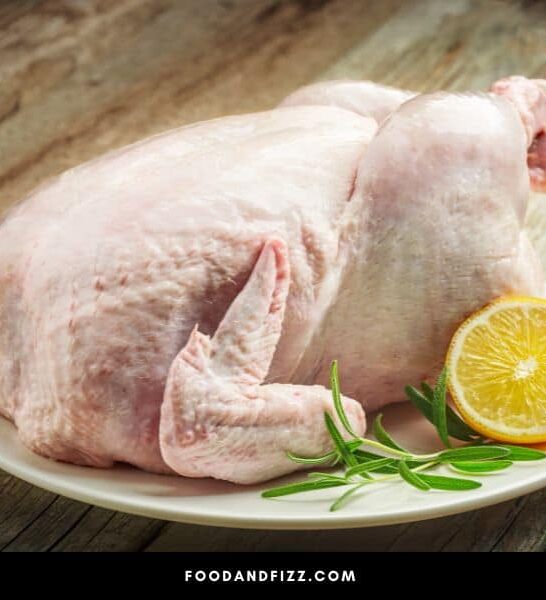Many people make the occasional mistake of leaving raw chicken defrosting on the countertop, then forgetting about it and going to bed. Unfortunately, it happens more often than you may think, so don’t kick yourself too hard over it. But is the chicken still safe to eat?
It’s understandable that you don’t want to waste food- especially if you’re on a budget. But at the same time, you certainly don’t want to see your family get sick. This can really leave you feeling as though you’re between a rock and a hard place. Should you eat the chicken or toss it in the garbage?
Raw Chicken Left Out Overnight
Raw chicken is definitely not safe to eat after it’s been left out overnight. Even if the chicken had been cooked, it should still never be left at room temperature for over two hours as bacteria can grow. Chicken should be discarded if it’s been left out overnight.
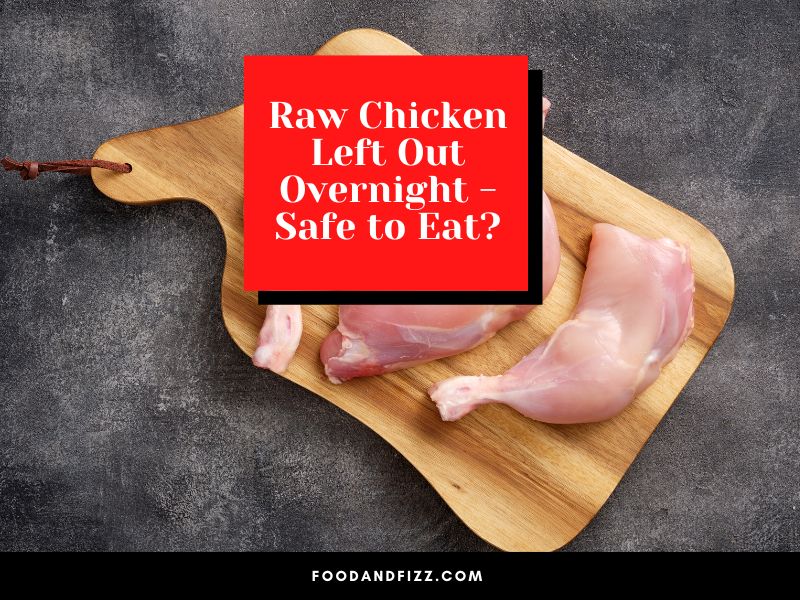
Chicken Is Not Safe If left Out Overnight
Regardless of whether the chicken is still raw or has been fully cooked, it should never be left out at room temperature for more than two hours maximum. Even if the chicken doesn’t smell bad, you should still throw it in the trash to stay on the safe side.
If your kitchen is especially hot, the chicken may go bad if left for less than two hours. Chicken is known for spoiling quickly when exposed to temperatures over ninety degrees. It’s best to stick to the well-known food safety rule of throwing it out whenever you’re in doubt.
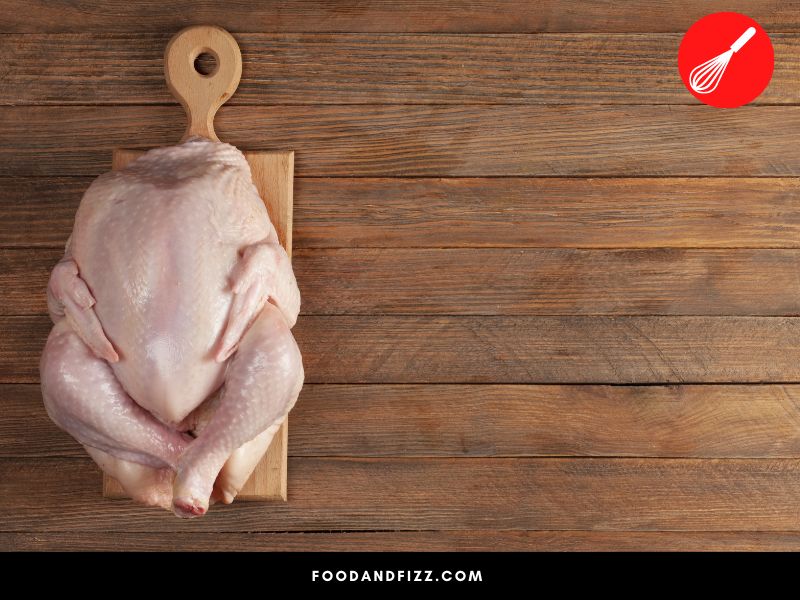
Dangers of Consuming Chicken That Has Been Left Out
Chicken is prone to the development of harmful bacteria- especially if it’s still raw and/or has not been stored properly. The most common type of food poisoning caused by chicken is campylobacter.
Symptoms of campylobacter poisoning include bloody diarrhea, nausea, severe stomach pain, fever, and vomiting. Sometimes it can lead to long-term health problems, such as the development of irritable bowel syndrome, or cause life-threatening complications for those with weakened immune systems.
Salmonella is another common culprit of food poisoning that can be caused by cross contamination in the kitchen or the consumption of raw or undercooked chicken among other meat products. Raw or undercooked chicken can also contain E. Coli bacteria.
While it may seem as though you can avoid food poisoning by simply cooking the chicken, the bacteria multiplies when the chicken has been left out and can still make you very sick.
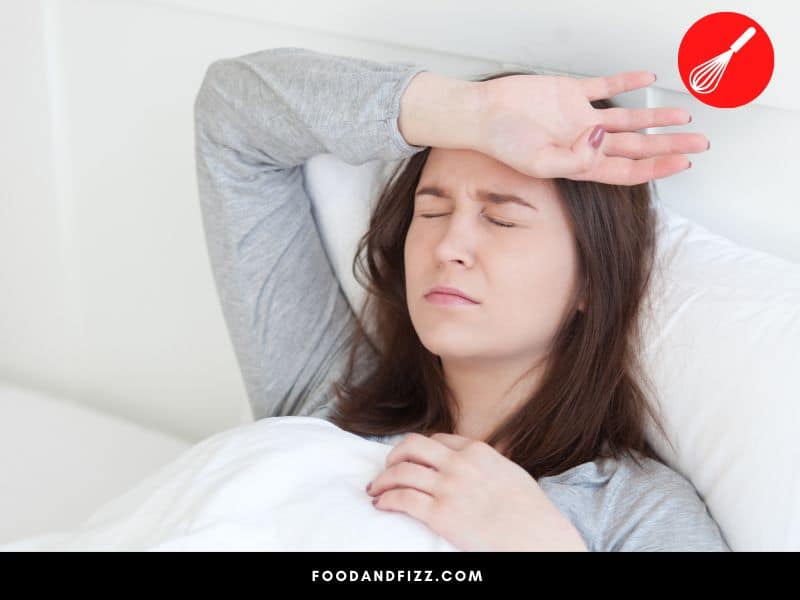
How to Properly Store Raw Chicken
Raw chicken should be stored in the freezer if you don’t plan on using it within the next two days. It’s safe to refreeze unused portions of defrosted chicken as long as it hasn’t been left out at room temperature for more than two hours.
If you are going to cook the chicken within the next couple of days, it should be completely wrapped and stored on the bottom shelf of your refrigerator, away from other foods. Raw chicken should be stored at temperatures below 40 degrees Fahrenheit to prevent bacteria growth.
You should always make sure that other food items don’t come in contact with raw chicken juices as this can cause cross contamination, which can make you sick.
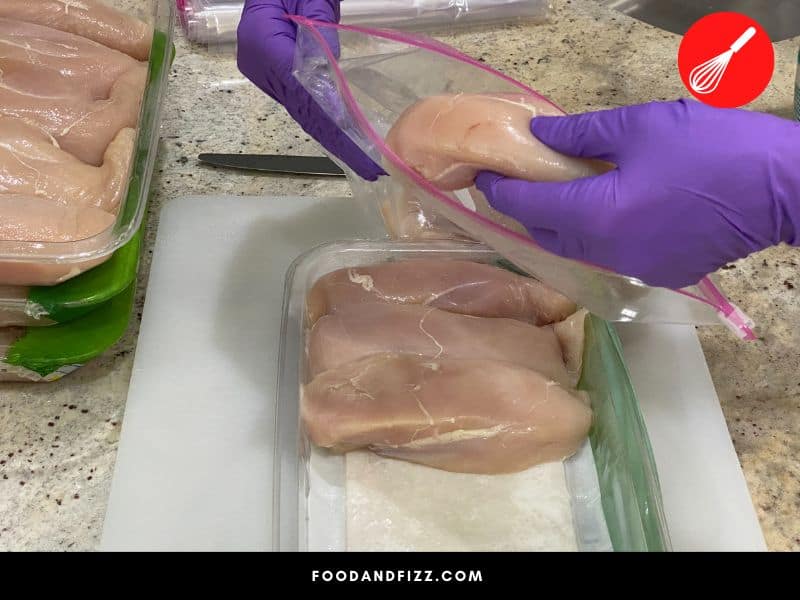
How to Safely Prepare Raw Chicken
Raw chicken should be cut and prepared separately from other foods and should never be washed as this could further the spread of bacteria. You must always clean your hands thoroughly after touching raw chicken and disinfect any surfaces and utensils the chicken has come into contact with.
It’s recommended to prepare any foods that you won’t be cooking, such as salads, prior to handling raw chicken. You also need to be cautious when using marinades, as basting cooked chicken with leftover marinade that was used on raw chicken can cause cross-contamination.
Chicken should be cooked to an internal temperature of 165 degrees Fahrenheit to be safe for consumption. Make sure that the chicken isn’t pink or bloody before you eat it.
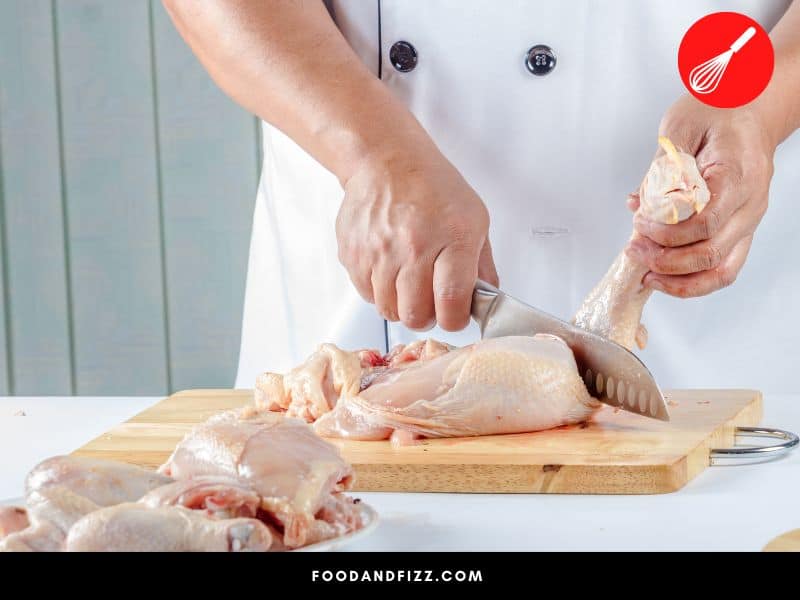
How to Defrost Raw Chicken
Raw chicken shouldn’t be left out to defrost on the countertop as this could potentially expose it to room temperature for longer than recommended. Instead, frozen chicken should be taken out of the freezer and placed in the refrigerator at least 24 hours in advance.
To avoid cross contamination, you should keep your raw chicken in an airtight bag away from other foods until it has fully defrosted and is ready to be cooked.
If you need to defrost your chicken quickly, you should place it in a pot of cold water and change the water every half hour to make sure it stays cold and doesn’t defrost the chicken too quickly.
Frequently Asked Questions to Raw Chicken Left Out Overnight
What Can You Not Do With Raw Chicken?
Raw chicken should never be washed as the juices can possibly spread throughout your kitchen and subsequently contaminate other foods. You should also cut raw chicken on a separate cutting board and never place raw or cooked foods on surfaces that once held raw chicken.
What Happens If You Eat Raw Chicken?
Consuming raw or rare chicken can lead to food poisoning from campylobacter, salmonella, or E. Coli bacteria. Chicken should only be eaten after it has been thoroughly cooked.
What Are The Safety Rules for Preparing Raw Chicken?
You should always wash your hands after touching raw chicken and thoroughly clean any surfaces that have come in contact with the chicken. Raw chicken should never touch any other foods in your refrigerator or it could cause cross-contamination.
Conclusion to Raw Chicken Left Out Overnight – Safe to Eat?
Sorry to say this, but that raw chicken that was accidentally left out overnight will need to be thrown in the garbage. There is no way to salvage it without jeopardizing your family’s health. But look at the bright side: At least you didn’t waste a porterhouse steak. You can just consider this to be a learning experience.
Chicken is one of the most affordable, healthy, and versatile meats, but it is especially prone to harmful bacteria. As long as you adhere to food safety recommendations when preparing, storing, and defrosting raw chicken, there are an endless number of dishes that you prepare with chicken. Just don’t forget to leave it out overnight again!

